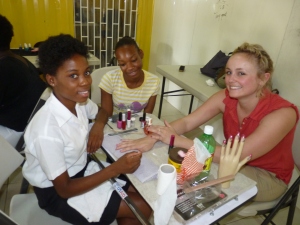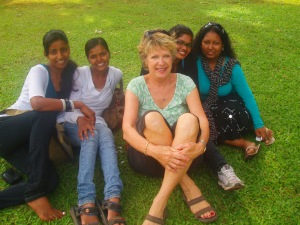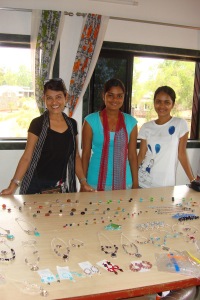Shelby’s Sentence
Shelby Shaandor Lewis, born April 4, 1967, has been sentenced to 20 years in prison for prostitution and human trafficking during an intensive sentencing hearing with Judge Sullivan in DC Federal District Court yesterday. Lewis’ family, children, and two out of four of his victims were present, along with numerous other individuals. Lewis’ attorney, Christopher Davis, began his opening statements by asking for the judge to sentence Lewis on the ‘low-end’ of the sentencing guidelines, therefore asking for 180 months (15 years) instead of the recommended and suggested 200 months (20 years). Davis argued that Lewis “stepped up to the plate and accepted responsibility to this issue.” Davis introduced previous cases (relating to different charges not including human trafficking or prostitution) for “equally egregious conduct” where defendants received only 96, 100, and 110 months. Furthermore, he tried to convince Judge Sullivan that Lewis would be “well into his 50s” before he would get out of prison. This, he assured us, would cause Lewis to change his behavior and leave this lifestyle of prostituting minors for commercial purposes. Davis also tried to minimize Lewis’ over 25 previous arrests for charges such as battery, assault, theft, solicitation for lewd purposes, impersonating a police officer, and use of handguns.
The hearing then took a spin when Lewis began saying he was sorry for his actions and for the situation he got himself and his family into. He said he was trying to “help” the girls he victimized, take them under his wing, provide for them, and be a father figure. Judge Sullivan jumped on these statements and immediately confronted Lewis. “You weren’t helping anyone out. You were gaining money from using those young girls and helping yourself.”
Life sentence for a victim
Bridgette Tillman, Assistant U.S. Attorney, read from a victim impact statement written by one of the young girls. When asked how the victim felt about herself she answered “angry, embarrassed, and self-pity.” When asked what the pimp (Lewis) should know about her, she said that the experience and abuse made her “angry and stronger.” Tillman went on to say that Lewis took advantage of the unsettled lives of these girls and promised them a home life, food, clothes, and shelter. Instead he put them on the street and made them work for him while he drove the streets looking for more vulnerable girls. Tillman argued that it made no sense for Lewis to serve only a 15 year sentence when these victims would be living a life sentence of shame, hurt, and pain, never able to get the years of life back that he violated them.
A helping pimp?
Judge Sullivan offered Lewis time to reconcile himself and say what he wished in regards to the hearing. Lewis again tried to convince the judge and audience that he was helping these girls and “never used or abused” any of them despite when the written plea clearly stated that he was an appointed guardian over four minors ages 12, 13, 14, and 16, of whom he prostituted. Each of these girls was living in his house alongside his own children. He transported them in his black, Ford Mustang and champagne, Chevy Tahoe between Temple Hills, M.D. and Washington, D.C., where he forced them to engage in street prostitution. They were required to give him all the money they earned.
After Lewis alleged that he never used or abused the victims, Judge Sullivan inquired whether Lewis pled guilty because he was guilty or rather to get the trial over with. Judge Sullivan appeared slightly confused and asked Davis and Lewis whether the plea of guilty still stood or whether Lewis was suddenly changing his mind and wanting to plead not guilty. Lewis declined answering some questions and instead motioned for the hearing to continue with the plea agreement of guilty.
20 years enough?
Judge Sullivan handed down a sentence of 200 months (20 years) to be served concurrently in the Federal Bureau of Prisons. He signed the sentence after Lewis voluntarily waived his right to attend his upcoming restitution hearing scheduled for December 16, 2010. In addition to the 20 years, Lewis must provide a DNA specimen for the sex offender registry, which he is required to register for life. He is to have no contact with children under age 18 (including his own children) or with the victims. Lewis must also attend sex offender treatment and abide to corresponding employment restrictions.
Lewis’ last words before leaving the courtroom were “I’m ready to go.” He appeared distressed, shook his head, and took his wedding band off. Judge Sullivan concluded his statements by telling Lewis that if he could make the sentence consecutive he would do so, extending the sentence of 20 years to 80 years.
Court discernment
During the sentencing the atmosphere was tense as the audience wondered whose arguments would carry more weight in influencing the judge’s decision. Occasionally the victims got up and left the courtroom; one girl left crying, overwhelmed by the situation. Some news reporters took opportunities to interview others present in the courtroom. By the end of the sentencing, the audience seemed to be in a damper mood, recognizing the consequences imposed on Lewis. However, most of the audience seemed pleased with Judge Sullivan’s decision, perhaps even wishing that he could have sentenced Lewis consecutively.
A pimp’s consequences
This case is monumental in fighting against human trafficking specifically in the United States. Judge Sullivan did a great job sentencing Lewis, as well as being true to the law. Those in attendance saw the concerned side of Sullivan when he encouraged the family to have Lewis’ four-year-old son leave the courtroom, stating due to the nature of the case it would be unwise for the boy to be present. In the end, is it fair that Lewis only received 20 years due to the type of plea agreement when in fact these four victims—all of whom were minors at the time of the offenses—will live with these memories for the rest of their lives? Is it true that Lewis will mellow and get away from this behavior once he is in his 50s and out of prison? The case and sentence provide ample deterrence factors to other pimps. Lewis will not only spend the next 20 years locked away, he will also potentially lose relationships with his children and family.
 Jay-Z’s catchy hit from 2000, hasn’t lost any novelty during its ten year run in the music industry. It even costs $1.29 on iTunes—the price reserved for only the most popular songs within the virtual-jukebox—instead of the standard $.99. In a culture where pimps are idealized as wearing bright orange top-hats, luxurious furs and sporting fancy canes, who wouldn’t want to be “doin’ big pimpin’ up in NYC”? I offer two basic reasons why becoming a pimp can be so appealing in 2010, but please remember, my rudimentary analysis is by no means exhaustive. I simply suggest that the promise of being cool and making lots of money can be a deadly combination that has created an enticing outlet for the up-and-coming commercial sex entrepreneur.
Jay-Z’s catchy hit from 2000, hasn’t lost any novelty during its ten year run in the music industry. It even costs $1.29 on iTunes—the price reserved for only the most popular songs within the virtual-jukebox—instead of the standard $.99. In a culture where pimps are idealized as wearing bright orange top-hats, luxurious furs and sporting fancy canes, who wouldn’t want to be “doin’ big pimpin’ up in NYC”? I offer two basic reasons why becoming a pimp can be so appealing in 2010, but please remember, my rudimentary analysis is by no means exhaustive. I simply suggest that the promise of being cool and making lots of money can be a deadly combination that has created an enticing outlet for the up-and-coming commercial sex entrepreneur. the “ghetto-fab” lifestyle. Just ask Border’s bookstore sales representative Margaret Rhatican about her experiences working in a place where you are sure to find the story of A Pimp’s Life within a series of books about “working the streets.” Just in case one needs a little extra guidance, Amazon offers The Pimp Game: Instructional Guide for pimps in training. In the world of cinema, movies like
the “ghetto-fab” lifestyle. Just ask Border’s bookstore sales representative Margaret Rhatican about her experiences working in a place where you are sure to find the story of A Pimp’s Life within a series of books about “working the streets.” Just in case one needs a little extra guidance, Amazon offers The Pimp Game: Instructional Guide for pimps in training. In the world of cinema, movies like  A pimp is not only a member of the “awesome-elite,” he’s rolling in the dough. It’s the most secure job in an un-secure economy. It’s “recession proof,” says Linda Smith in her book
A pimp is not only a member of the “awesome-elite,” he’s rolling in the dough. It’s the most secure job in an un-secure economy. It’s “recession proof,” says Linda Smith in her book What can be done to take the glitter and glamor out of the pimp-life? Change the vernacular. Searching the words trafficker, rapist, or abuser does not elicit the same Google images of fur, hats, and fancy canes as the pimp search, but instead, reveals truer depictions of the atrocity associated with each term. This necessary shift will take time and a complete transformation in society’s ingrained perceptions. Would a different approach that could act as a catalyst for such a change be more effective? Demi Moore and Ashton Kutcher think it’s possible. They have started a trend focusing on positive reinforcement with the
What can be done to take the glitter and glamor out of the pimp-life? Change the vernacular. Searching the words trafficker, rapist, or abuser does not elicit the same Google images of fur, hats, and fancy canes as the pimp search, but instead, reveals truer depictions of the atrocity associated with each term. This necessary shift will take time and a complete transformation in society’s ingrained perceptions. Would a different approach that could act as a catalyst for such a change be more effective? Demi Moore and Ashton Kutcher think it’s possible. They have started a trend focusing on positive reinforcement with the








